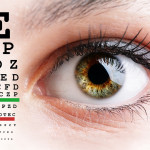Looking Good
By David Blyweiss, M.D.
Of all our senses, sight is no doubt the one we rely on most. The prospect of losing your vision is truly terrifying. After all, if your vision diminishes, your quality of life also declines—especially when it comes to activities like driving and reading.
The #1 Cause of Vision Loss
Open your arteries, improve blood flow for a new health miracle...
Did you know your circulatory system has over 60,000 miles of arteries, veins and other blood vessels, if stretched end to end?
But as you age, your blood vessels undergo changes, which may cause them to stiffen, thicken and get clogged.
GOOD NEWS! Doctors have now identified a “Miracle Molecule” inside your arteries that helps OPEN your arteries and IMPROVE blood flow.
It’s what Dr. Valentin Fuster calls it, "One of the most important discoveries in the history of cardiovascular medicine."To you, that means...
- Healthy blood pressure
- Sharper mind and memory
- Skyrocketing energy and muscular strength
- Increased pleasure and passion in the bedroom
- Improved circulation to every cell and organ in your body
Go here to discover a new natural way to significantly boost the levels of this miracle molecule in YOUR body NOW!
The most severe eye disease that can impact your sight is age-related macular degeneration (AMD), which is a leading cause of vision loss among middle-age and elderly people. AMD affects the macula, an oval spot near the center of the retina that controls central vision.
But AMD isn’t the only disease that can rob you of your sight. According to a study conducted by Lighthouse International, a nonprofit organization dedicated to research on vision impairment and rehabilitation, one in six adults over the age of 45 has some type of vision impairment including cataract, glaucoma or loss of night vision. These numbers just grow worse as we get older: About 15 percent of 45 to 64 year-olds report vision impairment, increasing to 17 percent for those aged 65 to 74 and 26 percent of those older than 75.
Are You Suffering From...
- Love handles and a pot belly
- Romance that isn't what it used to
- Forgetfulness and inattention
- Low (or no) strength and endurance
- A sex drive that's shifted into neutral...or worse
If so...you may have Mature Male Burnout. Click here to discover more about this unique condition and what you can do about it.
More Causes of Vision Impairment
Despite all of this gloom and doom, most people can take charge of their vision with promising results—no matter how old they are. Vision impairment has a variety of causes, including diabetes, tobacco use, long-term sun exposure, eye injuries and the use of certain pharmaceuticals such as steroids. I recommend getting a complete eye exam every year or two so that you can detect problems early. Then look at nutrients that can prevent the onset of eye disease, improve your eyesight and perhaps even reverse any damage already done.
- Lutein and Zeaxanthin
These nutrients function as blue-light filters and antioxidants. Harvard researchers report that people eating the most lutein- and zeaxanthin-rich foods had a 57 percent decreased risk of macular degeneration, compared with people eating the least. But food may not be your best source to get high levels of these two eye protecting nutrients—especially if you suffer from AMD. But lutein’s benefits aren’t limited to AMD. It also acts like a filter to protect the macula from potentially damaging ultra-violet light that can increase your risk of cataract. - Bilberry
This blue-purple berry is high in antioxidant compounds called flavonoids that prevent a host of eye problems, such as retinal inflammation, macular degeneration, retinitis pigmentosa, glaucoma, cataracts, nearsightedness, eye fatigue and night blindness. Legend has it that British Royal Air Force pilots flying midnight missions during World War II ate bilberry jam to improve their night vision, and current research shows that bilberry accelerates the regeneration of retinol purple, a substance necessary for reliable eyesight. - Antioxidant Vitamins and Minerals
I also tell my patients to increase the antioxidant vitamins and minerals they consume, both in their diets and with the supplements they take. In the famous Age-Related Eye Disease Study, researchers at the National Eye Institute found that, while individual antioxidants help protect vision, the greatest disease-risk benefit was achieved with a combination of vitamin C, vitamin E, beta carotene and zinc. And it wasn’t just protection against AMD. Another study, dubbed the Blue Mountains Eye Study, found that these antioxidants also help guard against cataract. - DHA- The Major Fat in Retinal Tissue
Another nutrient that most people don’t think of when they consider eye supplements is fat. One specific type of essential fatty acid called DHA is the major fat in retinal tissue. It plays a strong role in the photoreceptor cells of the retina (nerve cells in the retina that are responsible for our ability to see). The preliminary evidence I’ve seen suggests that a DHA deficiency may cause a marked decrease in vision. Fortunately, taking supplemental fish oil that contains DHA appears to protect against late age-related macular degeneration.
What You Can Do
If you find yourself squinting at the newspaper or have trouble seeing at night—or especially if you’ve been diagnosed with visual problems—I strongly suggest adopting a supplemental program that includes these nutrients.
But you don’t need to take a handful of pills for better vision. Look for a supplement that includes everything.
References:
Carpentier S, et al. Associations between lutein, zeaxanthin, and age-related macular degeneration: an overview. Critical Reviews in Food Science and Nutrition. 2009;49:313-326.
Chiu CJ, et al. Does eating particular diets alter risk of age-related macular degeneration in users of the age-related eye disease study supplements? British Journal of Ophthalmology. 2009 Jun 12. [Epub ahead of print]
Svobodová A, et al. Bilberry extract reduces UVA-induced oxidative stress in HaCaT keratinocytes: a pilot study. Biofactors. 2008;33:249-266.
Tan AG, et al. Antioxidant nutrient intake and the long-term incidence of age-related cataract: the Blue Mountains Eye Study. American Journal of Clinical Nutrition. 2008;87:1899-1905






